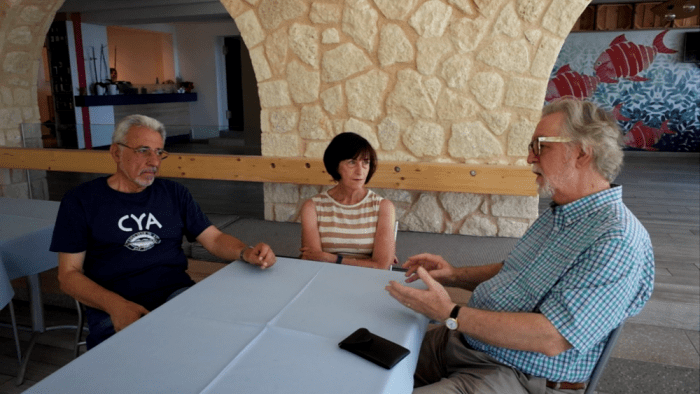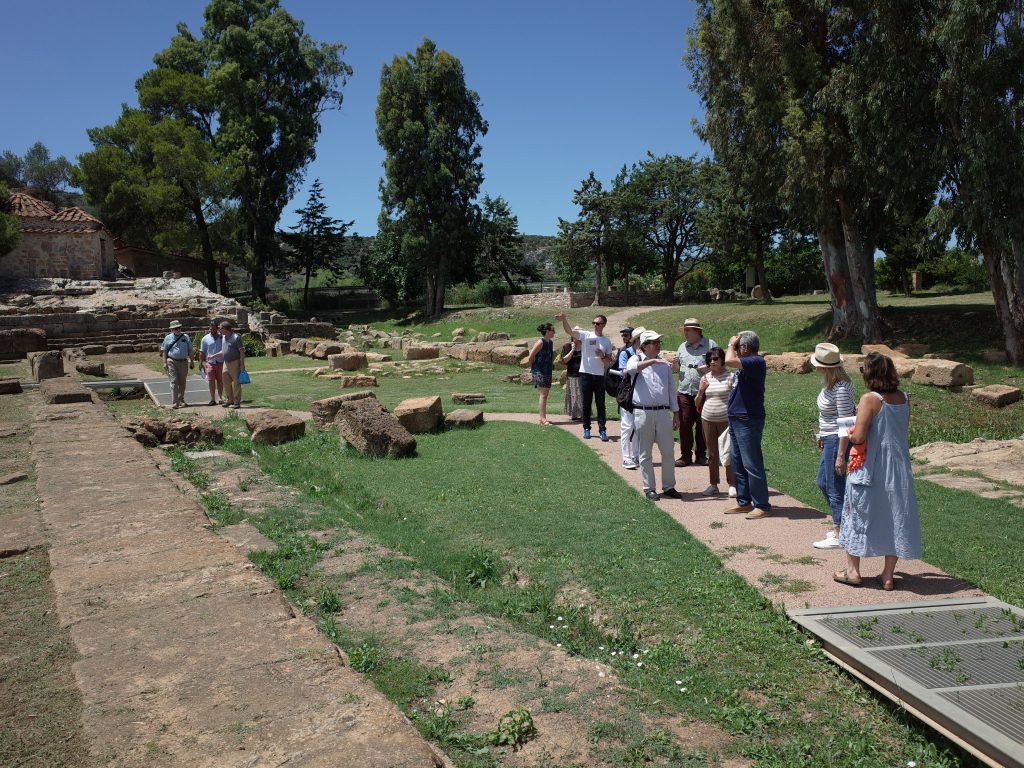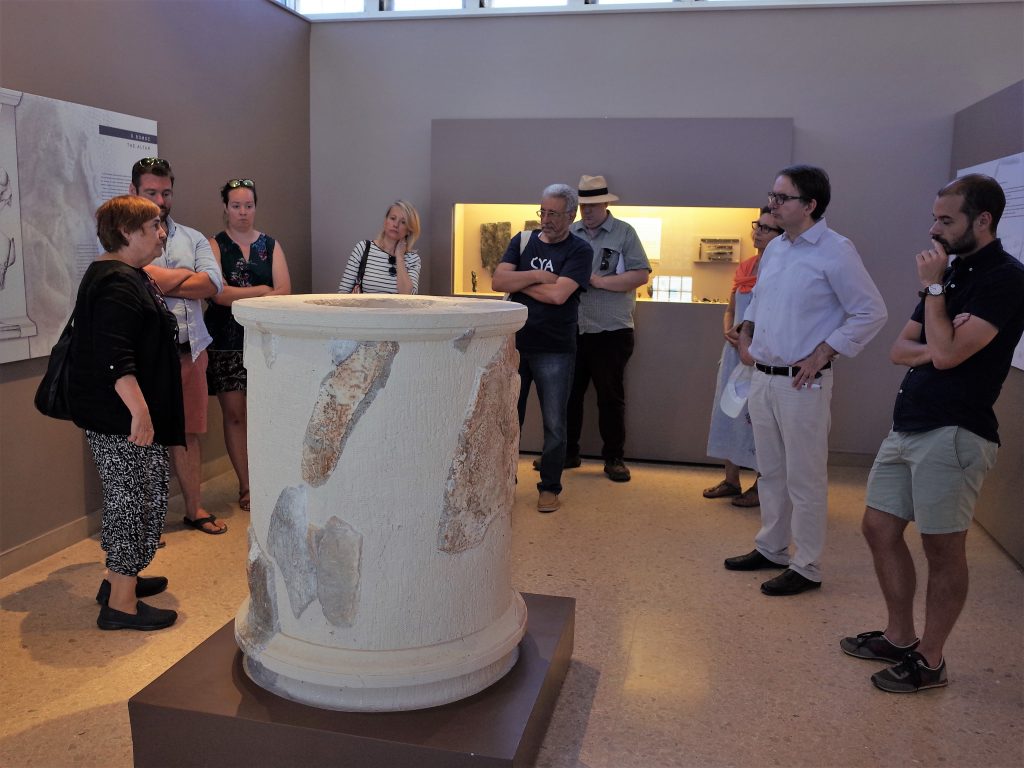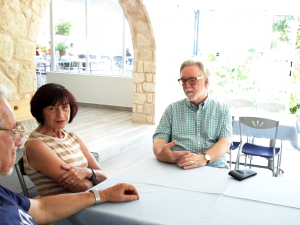
A conversation on Thucydides the Athenian
Following the end of a successful conference dedicated to Thucydides the Athenian, speakers and attendees alike had the opportunity to visit the ancient sanctuary of Brauron, guided by two expert archaeologists: Professor Olga Palagia (Professor Emerita Univ. of Athens) and Dr. Konstantinos Kalogeropoulos (Researcher at the Academy of Athens). The conference participants discussed reliefs and buildings that were constructed during the Peloponnesian war and the history of the cult of Artemis.
The visit concluded pleasantly with Greek seafood and Ouzo at a local Taverna, where Conference co-organizer Nanno Marinatos conversed with conference speakers, Prof. Thomas Scanlon (University of California, Riverside) and Prof. Anastasios G. Nikolaidis (University of Crete).


Nanno Marinatos: Tom, we just had a very successful conference on Thucydides the Athenian. We have all being thinking after your paper on metaphors of the body whether do you think Thucydides was a bit of poet? Do you think he used metaphors and symbols extensively? Or was he a very factual, "cool" historian, as usually people regard him? Thomas Scanlon: It was a fantastic conference, and we explored many aspects of Thucydides. He’s been called the ‘artful reporter’, which combines the idea that he gathers his facts accurately with his artistic side. His art consists in great story-telling. I wouldn’t speak necessary of metaphors – he is not using symbols the way some poets do, but I would say he uses allegory because allegory is talking about one thing but really addressing bigger issues. What I think is most interesting is that, at the beginning of his history, he says that his work is a possession for all time.He looks at human nature, and the way things have happened in the past which is according to human behavior, and this is the way they will happen in the future. So, in a sense he could have said: “I’m writing about this war, but it could have been any war”. This is one example of the way a war happens. The events of the Peloponnesian war were typical: the way people planned against each other, the way they were greedy; the way they strategized and tried to be fair to their own people; the way they did their best and then other people messed it up; the way they fought with themselves. It’s really a fantastic lesson for today, we can learn from these stories. And Thucydides’ storytelling is gripping; he tells one story after another, it’s a very compelling history. It’s not dry or political in a modern sense -‘just the facts’, but it is telling about how there was suffering in war and people were slaughtered, and unjust things happened - often by accident, and that’s the way things are in life. And he has helped us accept these realities, without offering any answer. Instead, he helps us think about how life really is. N.M.: I was wondering about that too because he’s trying to introduce a large perspective into the historical scope, what we may call a macroscopic view of history when he writes his so-called archaeology. When you see the broad patterns, you realize that human nature does the same things, there is a pattern and I know you have thought about that. T.S.: Yes some people say life is just one damn thing over another but it’s really the same damn thing over and over. I think that’s what Thucydides’ view is. Is that these things have occurred in the past - for instance the power of the Athenian empire, which we see in the Parthenon and in the achievements of Athens was also accompanied by a very brutal empire that was killing people and subjecting people. And Athens did that, until the other people said ‘no more, you’re not going to oppress us’. Before Athens, it was the Persians coming into Greece, and I think Thucydides saw the parallels between the Persian subjection of the Greeks and then the Athenian subjection of the Greeks, and then he saw the beginning of Spartan subjection so there is a circular pattern. N.M. Perhaps, though, not all periods are the same. For example, Pericles’ empire attempted to be just according to how Thucydides presents it.
N.M.: Tasos, I wanted to ask you a different question about the political Thucydides: do you think he was conservative or progressive? Where did he stand in this debate in the 5th century between more conservative and more sophistic kind of Greeks? Tasos Nikolaidis: I would say he’s a conservative politician. And the fact that he was an admirer of Pericles should not make us think that maybe he was a democrat. He admired Pericles because Pericles was the kind of a leader who could control the masses. Also, my feeling is that Thucydides became more conservative as the years went by. Not only because of his personal adventure with his banishment, after losing Amphipolis and being accused for not saving it, but because of what he says in the 8th book. There he refers to the best constitution of his life time as a mix of the many and the few (8. 97.2). And this is quite an oligarchical attitude that has nothing to do with the Periclean age and the Pericles he so much admired. Now, we assume that Thucydides made reviews. He wrote about an event and he knew what happened after that, and that influenced him sometimes in shaping the narrative in its final for. The unfortunate thing is that we don’t have his final word, we don’t know how what his overall idea of the war would be had he survived after it. N.M.: I find this very useful and enlightening. As we know from the conference, Lisa Kallet referred to Pericles as a democratic tyrant, so it seems that we have to question many things. I must confess, though, that I think that Thucydides remained a follower of Pericles until the end of his life. The ideals of the Funeral Orations reflect a civilized community which is paradigmatic of what any society can achieve.






